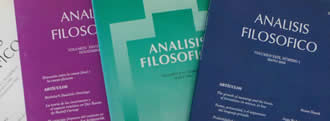Elementos filtrados por fecha: Diciembre 2025
Comienza 4 de abril de 2018
De 18.00 a 19.30 hs. - miércoles, quincenal
Coordina: Moira Pérez
Breve descripción: El Grupo de Políticas Queer ofrecerá un espacio para el estudio y la producción teórica en el área de la filosofía práctica, con particular énfasis en los Estudios Queer y otras disciplinas afines (estudios de género, estudios trans*, etc.). En las primeras reuniones se consensuará una agenda de lecturas y temas de interés, pudiendo incluirse una primera instancia de formación interna en caso de ser necesario (si las personas participantes no tienen conocimientos previos en el área). Se espera constituir un espacio que aliente el intercambio y la producción teórica en los temas trabajados, con fuerte anclaje en una lectura filosófica rigurosa de los textos seleccionados.
Comienza 3 de abril de 2018
De 15.00 a 18.00 hs. - 1er y 3er martes de cada mes
Coordina: Federico Penelas
El Grupo de Lectura Pragmatista trabajará este año en la lectura crítica de los artículos de John Dewey compilados en 1916 bajo el título Essays in Experimental Logic.
Comienza 28 de marzo de 2018
De 17.30 a 19.00 hs. - miércoles, quincenal
Coordina: Santiago Ginnobili
Comienza 20 de febrero de 2018
De 16.00 a 20.00 hs., todos los martes
Coordinan: Eleonora Orlando y Andrés Saab
Mark Coeckelbergh
University of Vienna
Lunes 12 de marzo de 2018, 11.00 hs.
Abstract: se adjunta paper
Publicaciones seleccionadas:
New Romantic Cyborgs (MIT Press) https://mitpress.mit.edu/books/new-romantic-cyborgs and Using Words and Things (Routledge) https://www.routledge.com/Using-Words-and-Things-Language-and-Philosophy-of-Technology/Coeckelbergh/p/book/9781138694163 https://coeckelbergh.files.wordpress.com/2017/07/using-words-and-thingsflyer.pdf)
Comienza 8 de marzo de 2018
De 17.30 a 19.00 hs. - viernes, semanal
Coordina: Eduardo Barrio
Comienza 9 de marzo de 2018
De 15.00 a 16.45 hs. - viernes, semanal
Coordina: Eduardo Barrio
Bettina Bock von Wülfingen
Humboldt-Universität zu Berlin
Miércoles 7 de marzo de 2018, 17.30 hs.
Abstract: In Argentina it has already been 50 years, in most European countries and the US decades later, that politics were set into place to check and make up for the consequences of the historical exclusion of women from academia. Still the count of women in the natural sciences, math and engineering though, fields promising more lucrative job opportunities than the humanities, is far below 30% in all these countries.
This presentation retraces the history of political measures to level the gender gap in the natural sciences, engineering and math (in brief „STEM“).
The talk paper focuses on two – seemingly conflicting – and internationally propagated approaches that represent the current status of the debate: Around and after the year 2000 in international feminist and gender studies two different solutions emerged for how to deal with biased contents in the STEM disciplines, in innovation and technology development. “Gendering Science” works with essentializing notions of sex-gender, believed to be easy to operationalize. “Degendering Science” applies queer and intersectional theory, seeks to ‘undo’ gender and to generally democratize science and technology development by early inclusion of most diverse (user) perspectives. Whether we talk about “gendering” or “degendering” therefore is not only an issue of precise language (do we ‘put gender in’ or do we level an already existing gender-bias). It involves theoretical grounding of far reaching concrete material impact in countries and institutions where these approaches are implemented with national funding, or that of the EU, US or the United Nations
Publicaciones seleccionadas:
•Bock von Wülfingen, Bettina (ed.) »Traces. Generating what was there«. Berlin/New York: De Gruyter 2017. In print and as ebook:
https://www.degruyter.com/view/product/485164?format=KOM
•Bock von Wülfingen, Bettina (Hg.) »Spuren. Erzeugung des Dagewesenen«. Berlin/New York: De Gruyter 2017. In print und als ebook:
https://www.degruyter.com/view/product/472548?format=EPUB
Comienza 7 de marzo de 2018
De 17.30 a 19.00 - quincenal, miércoles
Coordinan: Ariel Roffé y Carlos Limarino
Comienza 1 de marzo de 2018
De 10.00 a 12.00 hs. - jueves, quincenal
Coordina: Eleonora Cresto







